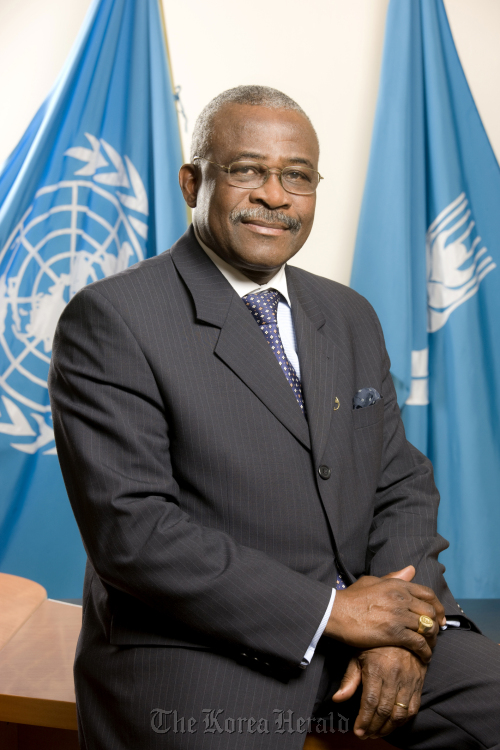The world’s population will hit 7 billion people later this year, the U.N. estimates. With this, comes the challenge of feeding a population that has increased by 40 percent in just over 20 years.
Just this week, the U.N. declared a famine in parts of Somalia with neighboring countries also affected by the worse drought to hit the horn of Africa in 60 years.
To find ways to respond to the greater need for the world’s basic needs, President of the International Fund for Agricultural Development and head of the U.N. Rural Poverty agency Kanayo F. Nwanze is in Korea to meet with government and agency officials to discuss agriculture investment and to bring forward IFAD’s messages about how best to accomplish feeding the one billion hungry people.
Just this week, the U.N. declared a famine in parts of Somalia with neighboring countries also affected by the worse drought to hit the horn of Africa in 60 years.
To find ways to respond to the greater need for the world’s basic needs, President of the International Fund for Agricultural Development and head of the U.N. Rural Poverty agency Kanayo F. Nwanze is in Korea to meet with government and agency officials to discuss agriculture investment and to bring forward IFAD’s messages about how best to accomplish feeding the one billion hungry people.

“IFAD works closely with poor rural people, governments, donors, non-governmental organizations and many other partners to develop and implement programs and projects that enable rural poor people to get better access to land and other natural resources, financial services, markets and technology,” he told The Korea Herald in an email interview ahead of his trip to Seoul.
IFAD’s vision places a strong emphasis on the business of agriculture, no matter the scale or size.
“Working to double the income of a smallholder farmer who scrapes by on less than a dollar a day is simply poverty management; but supporting that smallholder to launch a farming business, that is poverty eradication,” he said. The plan is to turn the world’s 500 million small farms into 500 million small businesses. Then, sustainable agricultural development would become a reality.
“It can guarantee long-term food security for all. It can also contribute to climate change adaptation and mitigation, and it can stimulate much-needed economic growth as your experience here has shown the world,” he said.
More than 680 million people in Asia and the Pacific region continue to live on less than $1.25 a day.
Furthermore, more than 70 percent of these are in South Asia.
“We aim at helping smallholder farmers and other rural people manage the risks they face, as well as enabling them to access emerging agricultural markets and opportunities in the non-farm economy and thereby improving their chances of financial success,” he said.
Food price volatility, other market risks and natural disasters could play havoc with the well-being and lives of rural populations.
“Policies that mitigate such risks and enable vulnerable people to cope with them and to coordinate their implementation are essential,” Nwanze said.
This is where Korea can play a strong role because of its experiences and best practices in overcoming poverty.
“The example of Korea shows that international assistance on food security can be more effective and successful when it is made in conjunction with a country-led planning, which goes to the very heart of IFAD’s strategy,” he said.
Studies show that GDP growth generated by agriculture is more than twice as effective in reducing poverty as growth in other sectors.
“But in order to accomplish this, development of the agricultural sector requires long-term investment, and this investment must come from a genuine global partnership between developed and developing countries,” Nwanze said.
Currently, 75 percent of the world’s poorest people ― 1.4 billion women, children and men ― live in rural areas and depend on agriculture and related activities for their livelihoods.
In the last few years, IFAD’s investment program has grown at an average of about 10 percent per year.
“We need to help poor rural people to manage the risks they face in their daily lives, to gain access to new markets, to expand their capacities and knowledge and to diversify their income sources.”
IFAD strongly believes that investment in agriculture is the most effective and efficient way to spur development.
“If we succeed, smallholder farmers can not only help to slow the impact of climate change, they also have the potential to grow more food to feed the world. This is why I will continue to make the request from donor and developing countries alike to step up investments in agriculture and smallholder farmers,” he said.
By Yoav Cerralbo (yoav@heraldcorp.com)








![[Weekender] How DDP emerged as an icon of Seoul](http://res.heraldm.com/phpwas/restmb_idxmake.php?idx=644&simg=/content/image/2024/04/25/20240425050915_0.jpg&u=)
![[KH Explains] No more 'Michael' at Kakao Games](http://res.heraldm.com/phpwas/restmb_idxmake.php?idx=644&simg=/content/image/2024/04/28/20240428050183_0.jpg&u=20240428180321)








![[Herald Interview] Mistakes turn into blessings in street performance, director says](http://res.heraldm.com/phpwas/restmb_idxmake.php?idx=652&simg=/content/image/2024/04/28/20240428050150_0.jpg&u=20240428174656)
